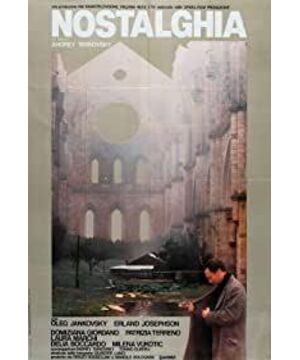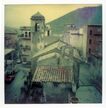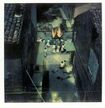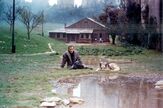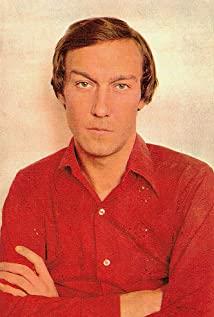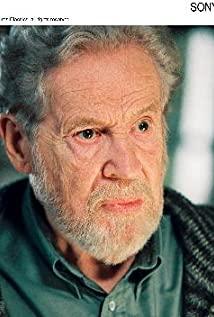Domenico’s self-immolation and the poet raising candles and wading through the hot springs are the most critical aspects of the movie, and it is also the point that has always puzzled me at the time. Judging from Domenico’s lecture in the Roman Forum, he was calling for numbness. The people of the world unite to break all stubborn barriers. At first he just locked up his family to avoid being polluted by the evils of this world, but in the end he decided to save the world. How can this spirit of sacrifice be traced back to it? How can a homesick poet exhaust his efforts in a foreign land to complete a behavior that is crazy in the eyes of others?
Stepping into an autumn dusk, I actually thought of a scene in "Homesickness": the poet rejected the beautiful female translator, and she left in anger, but because of his illness, his nosebleeds dripped on the corridor of the hotel, and he leaned over with white I wiped the blood on the floor with my handkerchief, and suddenly felt a kind of suffocation pain. This shot is still impressive and I often think of it. In this way, the first impression of "Homesickness" is not philosophy, not religion, but some extreme beauty. The pictures and lyrical details, and Ruoyouruowu have a profound meaning.
I saw Tarkovsky’s film notes "Sculpture Time" in a bookstore. This book turned out to be the first film theory I bought in the university. I bought three of them and kept them as gifts. The other two are now available. To a friend who also cherishes this feeling. The pages of the book I am reading now turn yellow because of long-term flipping, and there are traces of time expressed by Tarkovsky.
I opened the book, thinking that I could get a glimpse of the interpretation of the world we couldn’t understand through these words, but the words still made me seem to understand. I communicated with a friend. He said that if I didn’t finish watching all of his films, it’s true. It's hard to understand. After exhausting effort to collect his suit, he tried to understand each other through images and texts.
In the days that followed, I watched a lot of movies, but it was difficult to watch the movies produced in batches for entertainment. This is not a reprimand. All works that I have worked hard should be respected, but my personal preferences are consciously inclined to those. In movies with a heavy soul, even though this heavy soul often becomes my pressure.
In "Historical Records · Biography of Qu Yuan and Jia Yi": the husband of heaven is the beginning of man; the parent is the root of man. If people are poor, they are going back to their roots. Therefore, they are extremely tired and tired. The ultimate thinking about life is often in the context of the most painful, and the experience gained under this pain is enough to become a rare feast for people who are full of chaff all day long. People who enjoy it are often people who have never experienced pain.
I watched this film again these days, maybe for the fifth time. This time it was a little longer since the last time. Suddenly, I felt that a lot of things had suddenly risen a lot due to my spiritual experience. The lyric and excitement in the past seem to disappear. "Homesickness" is no longer an oil painting or a lyric poem.
On the one hand, it is a serf musician who returns and commits suicide by drinking, on the other hand, it is a poet who died in a foreign land. Time and location are always entangled with the issue of eternal return. The musician wrote in a letter to his friends in Italy: I can’t leave my childhood birches and homes in my hometown. Why can't he leave? The poet agreed to Domenico's seemingly absurd instructions-wading through the hot spring with a candle. After the initial experiment, he began to think: Why should I exhaust my energy to do this? I still have my hometown and family. Under the everlasting call of homesickness, serf musicians and poets were caught in a dilemma that they could not choose freely, but they made their own choices. Kant said that there are two things that are enough to make him feel awe-the starry sky in the sky and the moral law in his heart. Is there a deep blue and deep unknowable force like the starry sky in the sky that touches their souls, and "it must be so"?
There is an insurmountable gap between the poet and his female translator. This gap is the struggle between nothingness and existence. I have always believed that, compared to the reachable “existence”, the elusive and unreachable “nothingness” is the real “nostalgia” object. Nothingness is not laissez-faire, not lightness, but caution and heaviness—heaviness that a fragile and small individual cannot bear. For female translators, existence is limited, perceivable, and real-time-the carnal desire that excites the body and then quickly (relative to the long cosmic time) extinguishes is its representative. For poets-nothingness It is eternal, and then it begins to turn into homesickness, into the candlelight of immaterial existence, into the moral order in the heart, and in the illusion, it leads people to the end of nothingness, but at the same time, because of nothingness and universality, this is the poet The reason why I was able to communicate with Domenico.
Sensitivity and awe of the nihility are the basis for human existence, and it must accompany the tragic emotional life. People ultimately cannot bear this heart-caring pain, but this kind of compassion has disappeared in modern society. Domenico preached in the Piazza di Romano in Rome, hoping to use death as the carrier of nothingness as the final deafening and deafening. Domenico is struggling in the fire. The dog's grief and the indifference of the crowd proves that this divine gift will be transferred due to the alienation of human beings. Therefore, the poet will be so desperate to die for the surviving candlelight. Maintenance-this deep starry sky is no longer blue, but haze, and its corresponding inner moral laws are also hazy and ambiguous.
I finally knew that Tarkovsky's premature death was not accidental. It carried the weight of nothingness. Only a pure and deep soul can communicate with this simple and infinite incomprehensibility under the stars. This makes me question Sartre’s free choice again, why he has exhausted his efforts to try to communicate with him, this heaviness cannot be his bodily enjoyment, even if the explanation of his conscience as his motivation is ambiguous-I often Remind yourself not to turn conscience into an ideology. However, thanks to him, we were able to catch a glimpse of the fire of the soul's Nirvana, and to pick up the crystallization after Nirvana.
Nevertheless, under the fragility and inferiority of the individual, Tarkovsky gave us hope and courage-the inextinguishable candlelight that the poet traded for physical death was enough to warm my sad life, that Italy The Russian farmhouse under the dome is enough to be the object and comfort of our nostalgia.
View more about Nostalghia reviews


